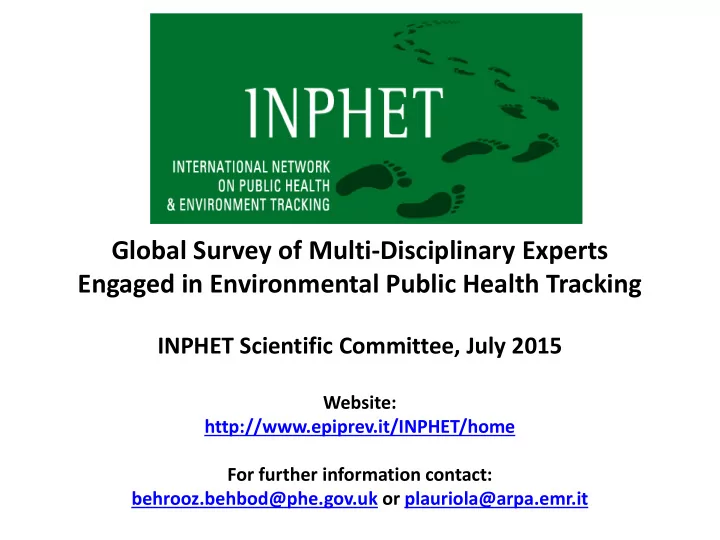

Global Survey of Multi-Disciplinary Experts Engaged in Environmental Public Health Tracking INPHET Scientific Committee, July 2015 Website: http://www.epiprev.it/INPHET/home For further information contact: behrooz.behbod@phe.gov.uk or plauriola@arpa.emr.it
The Public Health Problem • Environmental public health issues are becoming increasingly complex. • Globalization and growing population size are placing significant stress on the environment, while emerging threats in chronic and infectious diseases, injury, and terrorism, all have been associated with environmental factors.
Environmental Public Health Tracking (EPHT) • To address these challenges, EPHT aims to merge, integrate, analyse and interpret environmental hazards, exposure and health data. • Public health decision makers can use this timely, accurate and systematic data to inform and draft policies that reduce environmental health burdens and prevent disease efficiently and cost- effectively.
International Network on Public Health and Environment Tracking (INPHET) • INPHET aims to support the development, implementation and evaluation of national and local EPHT initiatives by providing an international clearinghouse for practitioners and researchers on how to monitor and use environmental intelligence for action. • INPHET will further increase understanding of this complex field, document decisions, improve comparability of risks between countries, and enable transparency and trust among citizens, institutions and the private sector.
INPHET Global Survey of Multi-Disciplinary Experts Engaged in Environmental Public Health Tracking • In the following slides we present the first findings of the INPHET expert profiles survey.
Results To Date (1) • 37 respondents between 12 th May – 30 th June, 2015. • Most respondents work in national governmental and academic organisations in Europe and North America. • Respondents have a range of experience in EPHT activities, predominantly in the biomonitoring of exposure and the surveillance of outdoor and indoor air hazards, exposures, and associated health outcomes.
Results To Date (2) • Potential contributions to INPHET by respondents include epidemiology, exposure assessment, teaching / training, public health information system support, and analysis or review for policy makers. • The most frequently reported benefits of being an INPHET member include opportunities for networking and research collaborations. • The following slides present further details.
Other EPHT activity experience Duration of experience (years) Use of GIS and interactive mapping applications less than 1 Risk assessment food 2 Risk assessment (outdoor) dust 2 Risk assessment water 3 Risk assessment soil 4 Noise exposure and assessment 1 to 5 Information technology and management/stewardship of data 1 to 5 Health surveillance in relation to food hazard 1 to 5 Noise and health more than 5 Health Impact Assessment in relation to waste management more than 5 Exposure assessment to outdoor air pollution more than 5 Data manipulation and analysis using statistical software more than 5 Chemical hazard surveillance more than 5 Epidemiological research 10 Health surveillance for chronic disease and risk factors 12 Chemical safety and risk assessment 12
Join us! • We are inviting anyone with an interest or expertise in EPHT activities worldwide to join and contribute to INPHET’s global membership and to be included in our register of EPHT experts. • If you wish to be included, please complete the online form available at the link below. It won’t take more than 5 minutes. https://surveys.phe.org.uk/TakeSurvey.aspx?SurveyID=8l0H9p41 • Please also share this link and presentation with your network.
Website: http://www.epiprev.it/INPHET/home For further information contact: behrooz.behbod@phe.gov.uk or plauriola@arpa.emr.it
Recommend
More recommend